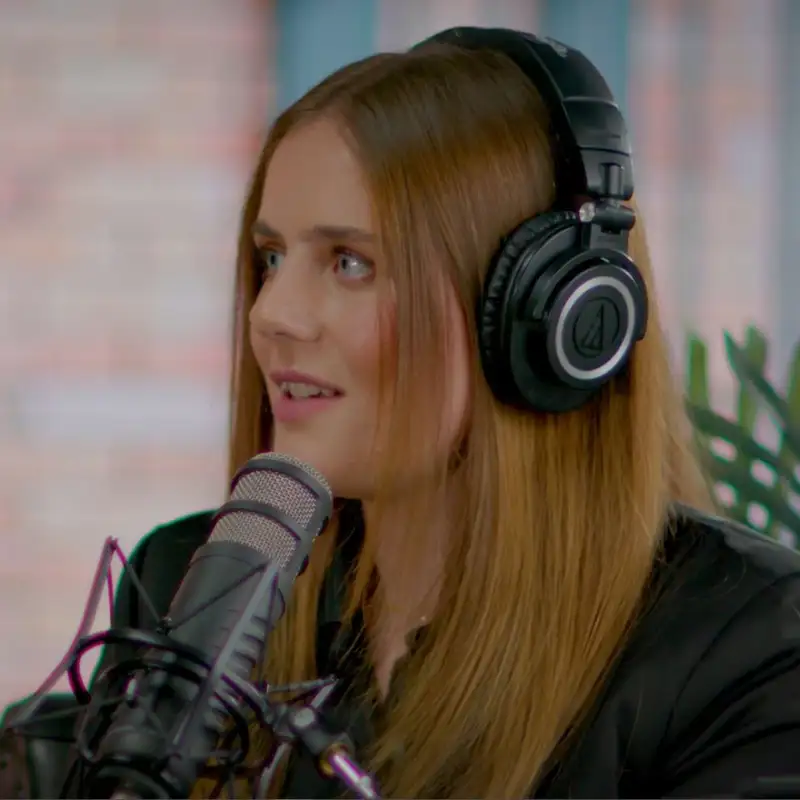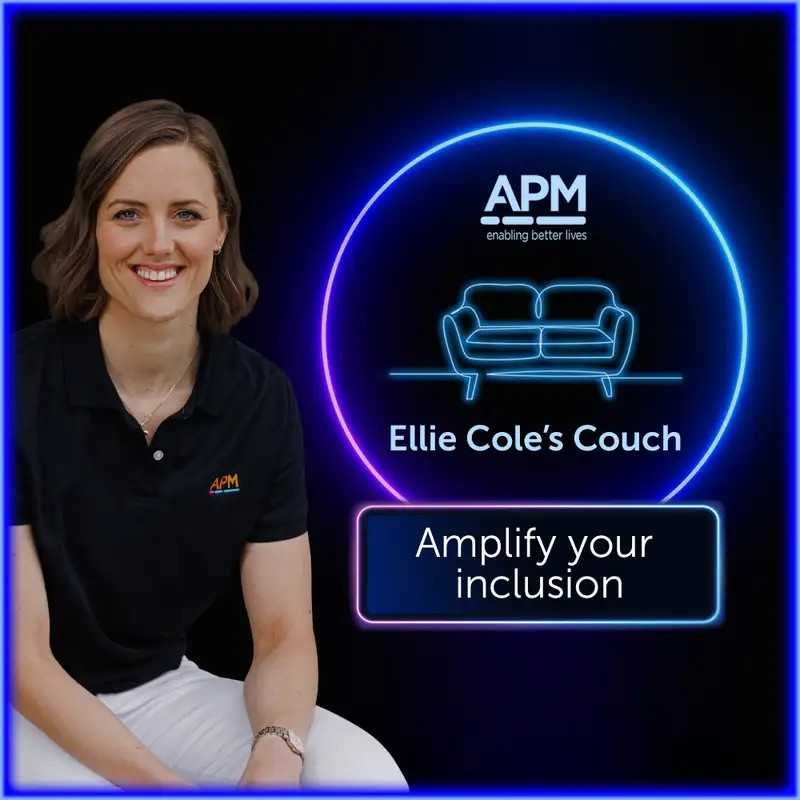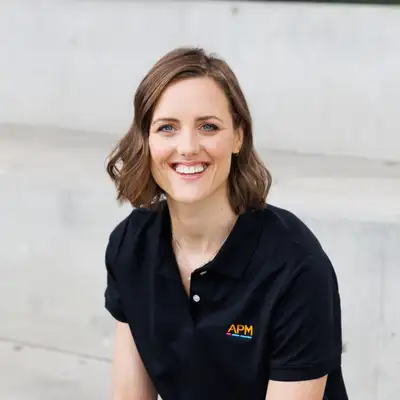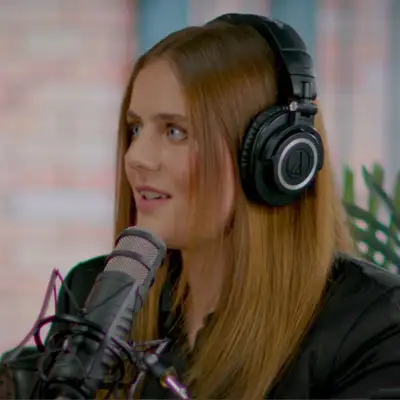ADHD and turning barriers into a career with Lyndsey
Lyndsey: My name is Lyndsey.
I'm 22 and I'm an employment
consultant at APM.
Ellie: Where did you grow up, and what was
it like, growing up for you?
Lyndsey: I was born in Canberra.
And then my dad got a job in Melbourne,
so we moved to Melbourne.
It was a bit tricky.
Mum and dad kept breaking up
and then getting back together.
So when they'd break up,
we'd go back to Canberra with mum
because her family's from Canberra,
and then we'd move back to Melbourne
when they were getting back together.
So then after the third time
my dad was like “no, no more.”
And then he met my stepmum.
They had a baby, and my
stepmum’s WA born and bred.
But then mum just took us.
We stayed in Melbourne for a little bit.
And then we ended up in Canberra,
but it was like Canberra, Melbourne,
Canberra, Melbourne and then Canberra,
Blue Mountain, Canberra,
Braidwood, which is a small country town.
I only moved to Perth a year ago.
My last job in Canberra,
so I worked at a school for disabilities,
but then I also - one of the teachers
that had founded
vacation care, for video games.
And so I ended up getting the role
of a coordinator there because
we worked together,
he knew me and he was like,
“yeah, just you've got the experience
in OSH (Out of School Hours Care), so just come on.”
And so I did that,
and I promised in my last - because it was
kind of a very sporadic move for me,
it was like July the 6th I decided.
I called my dad and I was like,
“I think I want to move to Perth.”
And by the 23rd I was in Perth.
Ellie: So what was your childhood like?
You mentioned that it was a lot of instability,
a lot of going to and from Melbourne.
But if you think back to your childhood,
what was that like for you?
Lyndsey: I look back on my childhood and I'm so glad
that I had the...it taught me so much.
But I feel like I had to grow up
at quite a young age in order to,
I guess, yeah, make sure that
my sisters were okay.
So, I look back on my childhood and I
honestly, I've blocked a lot of it out.
I remember the key points in the moving and
the school and that kind of aspect.
I have some really great friends
that I've had since year
six from when I lived in the country town
that I still talk
to literally every single day.
So, there’re so many fond
memories with them.
But yeah, growing up, it’s like
chop and change in my brain.
Some days I remember some things,
and sometimes I don't.
Ellie: Yeah.
Lyndsey: It's very back and forward.
Ellie: Talk to me about your journey
through the employment space.
I've already heard
you mention that you've
had a few different jobs
before you started working at APM.
But tell me about entry
into the workforce for you.
Lyndsey: I started working at 11.
Ellie: 11 years old!
Lyndsey: Yeah, at the cafe, behind the scenes,
like doing the dishes and
that eventually
progressed into making coffees.
So, then I was making coffees.
So, I was at that job for a little bit,
and then I moved to a pizza place,
and I really liked that.
That was a family. I still talk
to a few people from there.
And then I went into retail at 16.
I started at the Cotton On Group,
which was good,
but I only had
a Christmas casual position.
And then in Canberra, the DFO outlet,
they ended up doing that huge remodel,
so Cotton On pretty much got kicked out
and all of the Cotton On Groups got kicked out.
So they didn't have any jobs going.
And then I went into OSH.
So yeah, that's
when I went into OSH.
I started just as a regular educator,
and then I worked my way
up to assistant coordinator
when I was 18.
And that was great,
but it was very low pay.
And my boyfriend at the time, his mum
was a staffing officer
for a school for disabilities.
And she knew that I was not -
well, actually sorry
going back, I was a hairdresser for four years,
so, there was that as well.
And then we came, yeah, she said to me,
“I know that you are interested in kids.
Have you ever thought about working
with children with disabilities?
We're always looking for EAs, like, always.”
And I thought, oh yeah, okay, cool.
So I got into there,
and I absolutely loved it.
I, yeah, that's what got me
into studying teaching,
specialising in special education.
And I wouldn't have left there
if I didn't have to.
But then obviously,
I decided to move here.
So, I still love that job.
I think about that place
literally all the time.
I’m still in contact
with a few of the workers there.
Ellie: OSH.
Is that an acronym?
Lyndsey: Out of School Hours Care. Yeah.
Ellie: Oh, okay.
Lyndsey: So, when I moved here,
I again went into OSH.
But I just kind of, I was a manager then
and I just kind of,
I was like, oh, it's perfect for uni,
but at the same time, I was just thinking
that's not what I want to do.
And then APM came up and because
of my background in disability,
I thought, oh, okay.
I didn't even know that
that was an option,
like I didn't even think about that.
Ellie: So with your time at OSH,
what was it in particular
about working with children that had
disabilities that appealed to you
and really resonated with you?
Lyndsey: When I was in OSH,
I did - like I always,
leant more towards the children
with autism and ADHD because
there's such a misconception of children
with autism and ADHD.
I remember I had a
coordinator at the time
and she just didn't understand it.
They were just naughty,
they were always being thrown out.
They were - she just couldn't
deal with them,
parents were always being called
to come pick them up.
And I was just like, you can't do that.
You need to find some common ground,
some understanding.
So, when I then went to work at the school
for children with disabilities,
I learned so many different
like I guess, tactics on how to help, and how to
actually aid them and their development.
So, I was able to then take that into OSH
because I still was doing
after school care when I worked
at the school for disabilities.
So I'd go after if they were in need of people,
I guess, like in need of staff, and
just being able to help, I think for me,
like actually understanding.
I really love psychology and I really love
understanding how people's brain works,
because for me, that's how I learned
to deal with my diagnosis and stuff.
I think it should definitely be more
taught in school itself as well.
Ellie: I think if it was more taught in school,
it would certainly be understood a lot more.
Ellie: There seems to me to be a lot of
misunderstanding around
autism, around ADHD, people are
very quick to make assumptions.
Lyndsey: Yeah.
Ellie: In your experience,
being diagnosed with ADHD yourself,
is that something that you agree with?
Is that something that you resonate with?
Is that been something
that's been your experience?
Lyndsey: Yeah, I got myself diagnosed after year 12
because I didn't do well in school.
School is a bit different over east.
Well, in ACT it's a bit different.
You do high school year 7 to 10
and then 11 and 12 is called college.
So, you go to a completely different campus
and it's essentially very much like university.
You wear whatever you want.
You choose the classes that you want to do
on your free periods.
Ellie: Lots of freedom by the sounds of it.
Lyndsey: A lot of freedom. And I struggled there,
because there was - I didn't create a routine.
I only studied art because I was also
doing my hairdressing apprenticeship,
so I didn't have to be there all the time.
But all of my reports were that
I couldn't sit still.
I was always yelling out,
I was never focused,
I had to be doing three things at once.
I was always, yeah, talking,
didn't stop talking.
So, when I decided
I wanted to go to university, I was like,
I need to actually figure out
what's going on.
And I was fortunate enough that
one of the units I had done in
year 11 was Psychology.
So, I understood a little bit of ADHD,
there was a little bit there
that I was like aha,
maybe that's me, like a little bit.
And when I took it to my doctor,
he was like, “yeah, definitely.”
And then sent me off
and I got the diagnosis.
But I didn't medicate,
because once I knew that and
I figured out myself what
I struggled with,
and so with my psychologist,
we were able to sit down
and really work through a lot of it.
So, now I know that I had insomnia,
because my brain didn't stop moving,
like it genuinely didn't stop moving,
and that caused anxiety
because then I wasn't sleeping.
And then I didn't have routine,
so I was having meltdown after meltdown
because I had no idea what I was doing,
I always felt like nothing
I ever did was enough.
My brain was so confused
all of the time.
I couldn't focus on anything
because I didn't have a routine.
Since moving here, I've really created
a routine, which is good.
Every morning I get up at five,
I go to the gym - that's only new.
And then I go to work, and then I come
home and I will go for a walk,
because that really helps me,
like, decompress.
Ellie: So how long have you been
working at APM for?
Lyndsey: Since August. Not long.
Not too long, no.
Ellie: And how have you found the
transition going from,
where were you prior to APM?
Lyndsey: OSH.
Ellie: From OSH into APM?
How have you found that transition?
Lyndsey: I've never worked with adults before,
so it's a completely different ballpark
going from kids just “da da da da da,” to, like, adults.
Ellie: Yeah.
Lyndsey: It's like that was the tricky thing for me.
I understand the people, my clients,
like I really understand them
and that's what I try and get them
to realise is that I am listening.
So, I think transitioning, I'm
still doing what I was doing with kids,
like making sure they knew
I was listening,
making sure they felt heard
and seen and understood.
But having to then learn the,
I guess, Centrelink side of things
and having to - because I've
never had to really,
yeah, fully understand
the Centrelink side of things
or the Centrelink payments
and whatnot.
So, then trying to navigate learning that,
I would say would be the trickiest thing I’ve found.
Also, the marketing, like cold
calling places, I've never had to do that.
But having Fran and Megan beside
me, it's just, it's great experience.
Ellie: It sounds like you have an incredibly
supportive work environment,
at APM.
Lyndsey: Yeah.
Ellie: When you first walked through
the doors at APM,
what was that experience
like for you, particularly entering
an environment and a space
that you've never experienced before?
Lyndsey: I'd never been in a proper
office before.
So I was like, “wow, what is this?”
It kind of looked like the uni libraries.
Everyone had their heads down.
It was quiet.
Ellie: A lot of participants that you meet with
may be in a very similar situation,
where they're coming into APM,
they've never been in an office
environment before,
they're looking to find employment,
and then they have you
there as a disability employment
consultant to help them out with that.
Lyndsey: Yeah.
Ellie: That must be so comforting for them
as well as for you, to know
that you've lived through that
experience before.
Lyndsey: It's definitely nice when I, for example,
have a brand new client
who's never been with APM.
They're either directly registering with us
or they're having
their first initial appointment,
and I’m like, “oh, I'm new too, so let's work
through this together.
Let's go through the steps together.
Sorry, I'm still learning, so this
might take a little while,
but the appointment’s for an hour anyway.”
So we can talk, get to know each other
a little bit. So, it's nice.
Ellie: Yeah, I think there's a lot of well,
we know how much strength
there is in diversity and even being so
young, 22 years old and,
working in the capacity that you do,
it is an asset to have as well.
Lyndsey: Yeah. Some people definitely
see it as an asset.
Some are a bit like, “oh, you're too young, you don't know
what you're doing” kind of thing.
But I like to take that
as a challenge kind of thing.
I'm very much like, “you don’t
think I can do it,
but I'm going to show you
that I can do it.”
Ellie: You're very driven, I can tell.
But also, you know, hearing people making assumptions
about your age and working in APM,
that's something that, you know,
we're trying to work against with,
and making assumptions about other people
when they're trying to find employment.
Lyndsey: Exactly. We're trying to eliminate barriers
of people with disabilities.
And it’s what you say, when you're marketing
they'll say, “oh, well,
I can't take people with a disability.”
And it’s like “do you understand
what a disability entails?”
It's not one size fits all.
I have clients that might just have
some anxiety, and even then
I've got double leg amputees
that are more than capable of doing the job,
so I don't understand why,
but that's I guess, you’ve got to
eliminate that barrier,
because people don't know,
especially some old school people,
they just don't fully understand or
even really want to understand, I guess.
Ellie: You know what, I actually think that in
itself is a disability. If you think of,
you know, people with physical impairments
or people with disabilities,
if they're stepping into a workplace
and their biggest barrier
is attitudinal barriers from,
you know, other employers.
I've seen and met so many people
who are able-bodied and they have
something about their personality
or they're very close-minded
that actually prevents them
from experiencing new things.
It’s, yeah, I suppose quite
an interesting take.
Ellie: Do you find that your lived experience
and having ADHD, do you find that
that has become a real strength
and asset into your work
in delivering, you know,
top-line performance
for the participants
that come through the door?
Lyndsey: Yeah, I have a few participants of mine,
one of which, like she's starting her
own business, which is so lovely
but she sometimes struggles
with setting boundaries.
So, I'm helping her create boundaries.
So, I started off by, after
all of our appointments,
I'd send an email for what
I want her to do before she comes in next.
And now we're working up,
I've printed off day-by-day planners,
and we sit there in our appointments
and we plan what she's going to do.
And so she's starting to
then create her own.
That's what I really enjoy doing
with a lot of my clients,
helping them create a routine
that's going to work for them,
because I think routines
are the most important part.
Like for anyone,
even if you don't have ADHD,
having a routine, like,
it honestly will change your life.
Ellie: Yeah, I agree.
If you're going to describe
a Disability Employment Service to anybody,
how would you describe it?
Lyndsey: Everyone deserves their chance in life
and that's what we're here to help with.
We're here to break down the
barriers of working.
Everyone deserves to work.
Everyone deserves to live their life
how they want to do it.
And having a job
is one of the best ways to do that.
You meet new people,
you get your own money.
That's your money,
your hard-earned money.
We don't just help you get a job.
We help you become ready to get a job.
We set up the routines.
We help you work on your barriers.
If somebody tells me,
“I am not ready to get a job,”
I know that even if I get them a job,
they won't turn up.
So, how can we help them
get ready to get a job?
And I think it's, yeah, it's such a
good service that I really think
people should utilise to the fullest,
because that's what we're there for.
Ellie: And what is it about your job
that you love?
Lyndsey: Helping people. I think the thing
that fills my cup the most is helping
people and feel like I've helped people.
I just, yeah, knowing that I can
be the difference that makes
someone's day go from “uhh” to “yay!”
It's honestly, as soon as you get
someone their job you’re just like, “oh wow, yay!”
And I only just got my first client
their first job.
Ellie: Congratulations!
Lyndsey: It literally only just happened.
I was like,
“oh my God, this is so exciting.”
Ellie: How do you think working for an inclusive
workplace changes the culture?
This is the most supportive work
environment I've ever been in.
And the school for disabilities
that I worked at, that was amazing as well.
The culture was just fantastic.
But this is next level.
Everyone is there.
All of the employer consultants
and all of the business
managers, regional manager,
they're all there to help you succeed.
Ellie: Thank you so much for coming in today
and sharing your insights.
I've loved it and I'm really excited
to see what you do next.
Lyndsey: Thank you.
Creators and Guests



